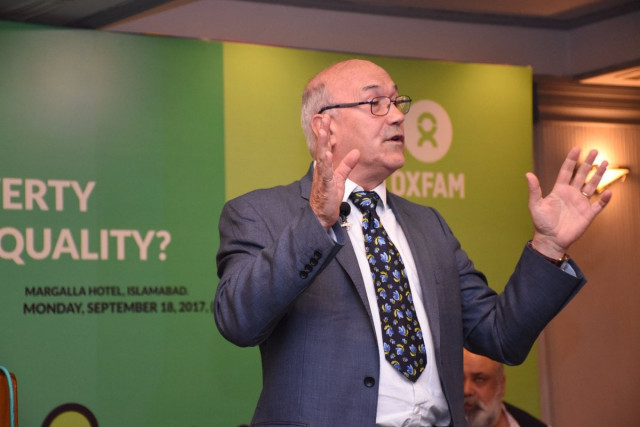Rich-poor gap: Handful have more wealth than half the world
Oxfam chief says just taxation and social policy crucial to tackling inequality

Oxfam GB CEO Mark Goldring. PHOTO: TWITTER/OxfaminPakistan
This was stated by Oxfam CEO Mark Goldring during a seminar on ‘Can we eradicate poverty without tackling inequality?’. The seminar had been organised by the Sustainable Development Policy Institute in collaboration with Oxfam on Monday.
He said fair taxation; a minimum wage which was closer to a ‘living wage’; while providing better social policies which were crucial to halting the rise of inequalities and tackling poverty.
“Eight billionaires own the same wealth as 3.6 billion people who form the poorest half of the world’s population. While one in nine people on the planet will go to bed hungry tonight while a small handful of billionaires have so much wealth they would need several lifetimes to spend it,” Goldring said.
“Inequality is not only keeping millions of people trapped in poverty, it is fracturing our societies and poisoning our politics.”
One way to measure inequality in society, the Oxfam CEO said, was to compare the growth of private security companies. He explained that only big businesses and the wealthy can afford services offered by these companies - and compare that to the growth of the police force which has to look after all the people.
“Policies are made by the rich for the rich. How often have you seen the rulers using public health facilities,” he remarked.
Goldring said the existing international tax system, which takes away from the countries which are resource-rich, was massively unfair. Tax, wage and public policy are the most important pillars to reduce inequality, he said.
He added conflicts, natural disasters and emergencies, and sometimes poor governance was responsible for rising poverty.
“The world has become better at many things but one of the things which we have not become better at is conflict resolution. In South Sudan, one leader is fighting another leader and the victims are the 99 per cent of people. And we cannot do anything but more of the same,” he said.
Last year, Oxfam said the world’s 62 richest billionaires were as wealthy as half the world’s population. However, the number has dropped to just eight in 2017 because new information shows that poverty in China and India is worse than previously thought with the bottom 50 per cent even worse off amid a fast-widening gap between the rich and poor.
Goldring said narrowing the gap between the richest and the rest requires a human economy; one that does not polarize the world on wealth with the one per cent of the world’s population owning as much as the other 99 per cent.
“An economy which encourages and rewards enterprise and innovation, yes, but one which also offers everyone, regardless of background, a fair chance in life and ensures when individuals and businesses succeed, they do so for the benefit, rather than at the expense, of others.”
SDPI Executive Director Dr Vaqar Ahmad presented an outlook of the inequalities which exist in Pakistan. He pointed towards the indirect tax system which was aggressive and biased towards lower income groups.
He said this system was putting a greater burden on the low-income households than the upper ones and hence, was responsible for the growing gap between the rich and poor in the country.
The vertical and horizontal implications of inequality are also important, he said, warning that in the case of the latter gender disparity has been a significant challenge for the society
as a whole.
Published in The Express Tribune, September 19th, 2017.



















COMMENTS
Comments are moderated and generally will be posted if they are on-topic and not abusive.
For more information, please see our Comments FAQ